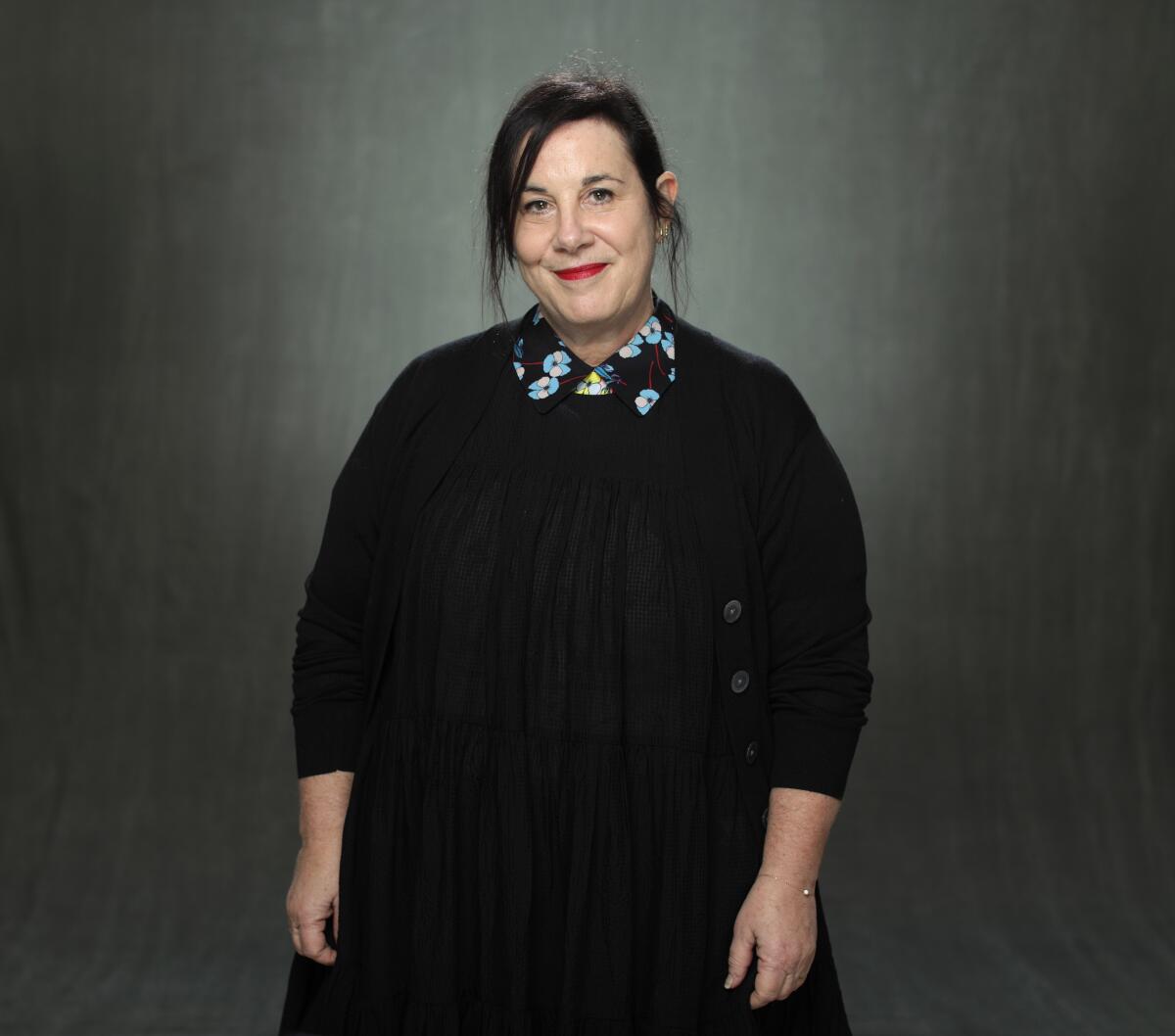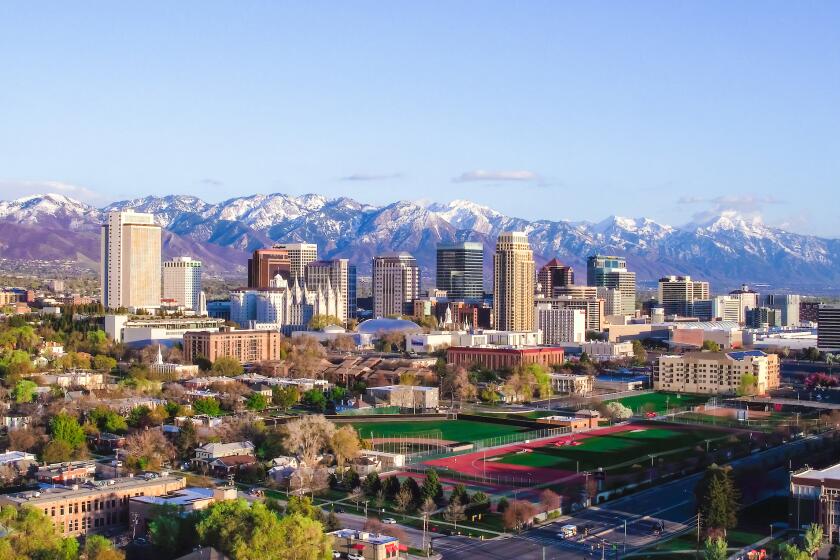‘Once Upon a Time’ costumes shun the 1960s stereotypes and find the characters

Quentin Tarantino’s ninth film, “Once Upon a Time … in Hollywood,” is set in 1969 Los Angeles at the end of Hollywood’s Golden Age. It showcases Oscar-nominated costume designer Arianne Phillips’ divine array of looks for historical and fictional characters alike.
Phillips suspects her somewhat nonlinear career (she’s worked with Madonna for 22 years across many mediums and has been a fashion editor and theater costume designer) meant she was up for the challenge of bringing Tarantino’s film to sartorial life.
“It was a real camaraderie I’d never really experienced on that level,” Phillips says. “It was every fantasy I could ever have in terms of a film about Hollywood and being part of a contemporary Hollywood history.”
You had a serendipitous path to this job; can you tell us about it?
I worked on a Patty Hearst film for about a month when it fell through very suddenly. During that prep time the producer told me Quentin was also working on a film in the same period. I called my agent and said, “I have this incredible crew I’ve assembled and want to keep them working, do you know anything about Quentin Tarantino’s movie?” My agent got the door open for an interview and we were told Quentin was only going to see two designers and he’d meet with me. I found out later his last costume designer — now a director — had already put my name in the mix. Quentin was definitely on my short list of directors I wanted to work with.
I read Quentin puts many of his own specific costume choices into the script.
Every script does to some extent, but the real difference is most directors use them as placeholders. But with Quentin it was the opposite. He said, “When I say I want a Hawaiian shirt, I mean a Hawaiian shirt, but the color and motif I leave up to you.” Not all the main costumes were scripted — maybe just five or six major pieces that were very important to him. But he said, if you have a better idea bring it to the fitting and we’ll figure out what works. That’s the best-case scenario with a director.
The color palette was tight with yellow, gold, brown and some prominent gold jewelry.
That’s the fun part, right? I knew I wanted a lot of yellow; it’s California and sunshine and I used it with Cliff’s shirt, a lot on Sharon [Tate, played by Margot Robbie] and Rick’s [Dalton, played by Leonardo DiCaprio] mustard mock turtleneck. Since we weren’t making a documentary, we used what made the most sense visually in telling the story. There were some colors Quentin just hated — such as certain greens and browns, which were definitely a part of the era but he felt were just too depressing, so we adjusted the palette.
I was raised in L.A. during this period and was happy to see you eschewed much of the hippie stuff: tie-dye, beads, fringe vests, etc., which can look somewhat goofy and garbled on film.
That was something Quentin and I talked about in the interview. We both had pet peeves with fringe and tie-dye, which are kind of lazy monikers for the period, an easy way out. And to a contemporary eye they become a cliché and too retro and it can take you out of the movie.
How much were Brad Pitt and Leonardo DiCaprio involved in the creation of their look?
Quentin joined me for the first fittings for both. He’s a raconteur and would give all these anecdotes and background stories about Rick — he did the same with Brad and his character, Cliff. Both Brad and Leo were very open and taking it in and trying what we had. Quentin and I had already gone through the pieces before they arrived. Quentin also really trusts Brad and Leo, and he wanted to see what they gravitated toward. At a certain point, they look in the mirror and say, “That’s him. That’s the guy … that’s Cliff, that’s Rick.” And it sets the tone, even with the one costume and then it all kind of falls in. We know who this guy is.
Many of the characters wear the same gold jewelry throughout the film. Were these vintage pieces?
Leo’s medallion I had made; it has his monogram on it. I knew I wanted a medallion when I read the script; of course, Steve McQueen made it famous. It’s like a macho piece of jewelry, it’s a bit bravado, and Leo and Quentin both responded to it. Cliff wore some hippie bracelets and he had one of my favorite accessories: an original vintage belt buckle I found at a costume house given just to members of the stuntman association.
I also noticed Rick and Cliff’s shoes were opposite: Rick’s cowboy boots vs. Cliff’s soft ’60s fringed moccasins.
I knew from Quentin’s past work shoes get a lot of play in his movies, which is exciting because a lot of times you put energy in the footwear and then never see them. It made perfect sense Rick would wear cowboy boots. They have an attitude and a bravado to them, kind of don’t ... with me, and Rick Dalton was tough, strong, with a bit of ego to him. Cliff, on the other hand, we don’t really know if he killed his wife and he has this kind of mysterious outsider reputation. The idea of him wearing a soft shoe was the ultimate for an intimidating guy. It also shows how Cliff isn’t as out of step with the times as Rick; we see his hipness a bit.
You spent a lot of time with Sharon Tate’s sister, Debra. How did she help you?
Debra was a consultant on the film, and it was a gift to have her endorsement and anecdotes. We didn’t actually use any of Sharon’s real clothes in the film but I got to see and feel them. I did get to use some original jewelry pieces; Margot [Robbie] wore one of Sharon’s rings throughout the movie. It gives you a physical touchstone — kind of like a talisman to connect to Sharon. After all, this film was about her life, not the dark mythology surrounding her death.
More to Read
Only good movies
Get the Indie Focus newsletter, Mark Olsen's weekly guide to the world of cinema.
You may occasionally receive promotional content from the Los Angeles Times.










